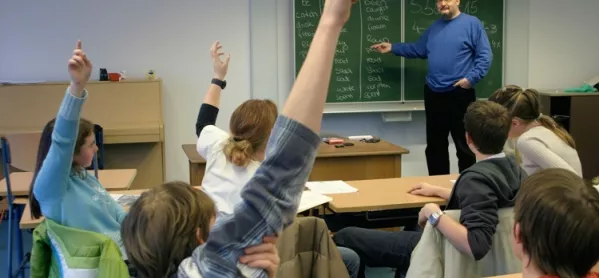A structured lesson observation programme, aimed at helping teachers learn from each other, made no difference to pupils’ GCSE maths and English results, a new study has found.
The Education Endowment Foundation (EEF) funded an evaluation of the University of Bristol’s Teacher Observation intervention following a US study which had found that structured lesson observation led to gains in student and teacher performance.
But after a two-year randomised controlled trial in 82 English secondary schools, no difference was seen between the progress of GCSE pupils whose schools had taken part and a similar group of pupils in schools where teachers did not take part.
Maths and English teachers taking part in the trial were expected to complete at least three 20-minute peer observations over two years and then rate each other’s lessons using a structured format which looked at particular aspects such as managing behaviour and classroom organisation.
The programme was evaluated by the National Foundation for Educational Research, which found no impact on English and maths GCSE scores, but which also pointed out that many teachers failed to complete the recommended number of observations.
The teachers carrying out the observations had been divided into two groups. One “low dosage” group was asked to carry out at least three observations a year but recommended that they did six observations.
The other “high dosage” group was asked to complete a minimum of four observations, but recommended that 12 observations were carried out.
Timetable difficulties
But some teachers told researchers that they had difficulty fitting the observations into their timetable, while others said that they felt uncomfortable taking time out of teaching to complete observations.
And the evaluators found that on average the teachers in the “low dosage” schools completed three observations a year - the minimum number and half of what was recommended. Those in the “high dosage” schools completed six observations a year - again half of what was expected. Seven schools did no observations at all.
Even when observations did take place, there was no evidence that teachers who did more observations had better pupil results.
The researchers pointed out that as well as it being difficult for teachers to fit in the required number of observations - almost three-quarters of the control group schools already did some peer observation.
“The lack of impact seen in this study may be because the structured teacher observation intervention was no more effective than existing practice rather than because general peer observation has no impact,” the report concluded.
And it added that in the US, where an impact had been seen, lesson observation was linked with professional development, outside observers and annual performance bonuses - none of which were used in the English trial.
Sir Kevan Collins, chief executive of the EEF, said: “Today’s research tells us that schools shouldn’t expect to see an improvement in results by increasing the frequency and intensity of their teacher observations. Even though some teachers in our trial struggled to fit them into their busy days, when they did, they made no difference to pupil results.
“Focusing on proven ways of improving teaching - like tried and tested CPD courses and feedback methods - are likely to reap bigger rewards.”
Want to keep up with the latest education news and opinion? Follow Tes on Twitter and Instagram, and like Tes on Facebook.





